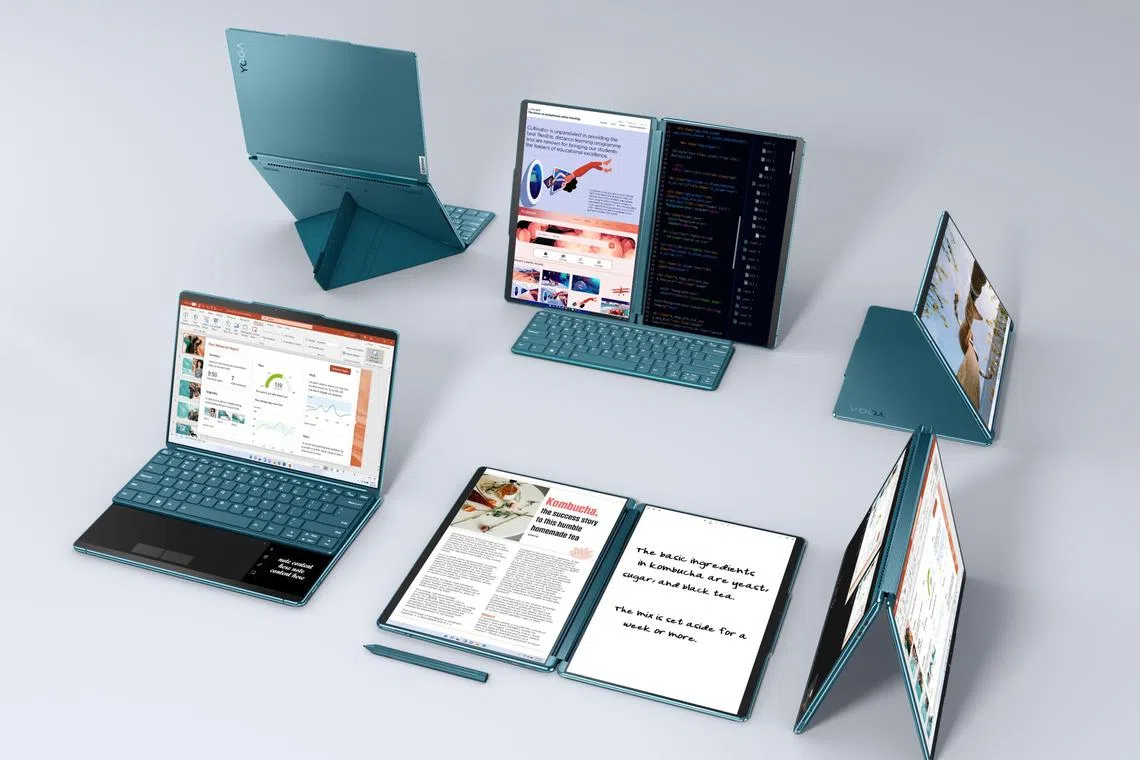CES 2023: Laptop screens too small? Lenovo launches Yoga Book with 2 of them
Sign up now: Get ST's newsletters delivered to your inbox

Lenovo's new Yoga Book 9i has two screens that allow users to view two separate files or programmes simultaneously.
PHOTO: LENOVO
LAS VEGAS – Many laptop manufacturers have been trimming the edges of laptop screens – or bezels – to maximise their displays, but this year, Lenovo asks: Why not have two screens on a laptop instead?
In what the manufacturer calls the world’s first dual-screen laptop, Lenovo has swopped out the keyboard at the bottom half of a standard laptop with a second Oled panel in its latest Yoga Book 9i.
Users can view content across two 13.3-inch panels, or view two separate files or programmes simultaneously for better productivity, said Lenovo in a statement on its new releases at the Consumer Electronics Show 2023,
This configuration changes how users interact with the laptop. They can fold the laptop in half and use its touchscreen like a tablet; fold it into a tent to use for presentations while having another screen to guide the presenter; or prop it up at 90 degrees, like a normal laptop.
Lay it flat and long chunks of text flow across both screens – a function Lenovo calls “waterfall mode”.
Users who prefer a traditional typing experience can link the dual-screen laptop to a Bluetooth keyboard, which can also be positioned on the bottom screen like a standard keyboard. Meanwhile, the exposed section of the screen beneath the keyboard doubles as a trackpad, with convincing haptics that make users feel as if they are clicking a mousepad.
The screen at the bottom can also conjure a virtual keyboard.
At just under 16mm thick, the Yoga Book 9i is a hair thicker than a MacBook Pro, and undercuts it by weight, at 1.38kg. Lenovo claims the battery will last just over seven hours, and up to 14 hours if only one screen is used.
The Yoga Book 9i starts at US$2,099.99 (S$2,800) and is expected to go on sale in June.
Lenovo also revealed a slew of work-focused laptops, such as new additions to the ThinkPad series, and new laptops in its gaming-focused range, Legion.
The company also announced Project Chronos, an upcoming commercial motion-capture console that allows users to record their physical movement for avatars in a 3D virtual world without the use of wearable sensors.
The console, which can be mounted on a wall or under a TV, is packed with a depth sensor and can be tilted down for privacy when not in use.
The project does not have a launch date yet.
Lenovo said: “The user’s movement is captured via an advanced depth camera that replicates their real-time actions within a 3D-rendered virtual environment, displaying it on a monitor in their home... like a TV or large PC screen.
“Once their avatar is created, the user can control it using only their gestures, movements, posture, and even facial expressions, and see it rendered on screen in near-real time.”
The company said it is working with developers and content and service partners to expand the project’s ecosystem.


